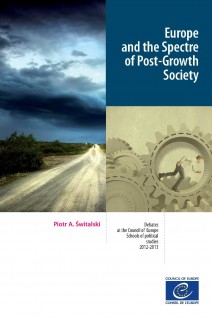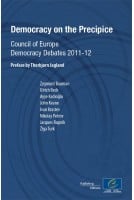



Europe has been going through its most serious crisis of values since the fall of communism. In public discourse, economic and social pressures have overshadowed the other dimensions of the crisis, including societal values. However, the crisis of values would appear to be more than simply an effect of the recession.
Europeans have lost trust in democratic institutions at all levels: European, national and local. Rising xenophobia and discrimination against minorities undermine the vitality of the European model of tolerance. Europe is plagued by endemic corruption which costs it more than €100 billion annually, triggering political instability.
Some believe that once Europe is back on the path of growth the crisis of values will disappear, and that there will be a resurgence of faith in European integration.
But in the long term, growth in Western societies may be impaired by serious “headwinds” resulting from demographic trends and rising inequalities, and Europe may become the first post-growth society. European societies are already changing their traditional characteristics as a result of exposure to the effects of two global mega-trends: the empowerment of the individual and cosmopolitisation.
Can the European project be of relevance when addressing these challenges? What role in this process can be played by the Council of Europe, which is the embodiment of the idea that Europe is big-ger than the European Union and the European agenda is richer than the economy and politics?
Contents
Introduction: Europe and the crisis of values
The quest for a european breakthrough
The imperative of growth
Europe and the diffusion of power
The challenge of identity
The multitude of Europes
Conclusions: Europe’s global future
References
Télécharger un extrait (1000)



Europe has been going through its most serious crisis of values since the fall of communism. In public discourse, economic and social pressures have overshadowed the other dimensions of the crisis, including societal values. However, the crisis of values would appear to be more than simply an effect of the recession.
Europeans have lost trust in democratic institutions at all levels: European, national and local. Rising xenophobia and discrimination against minorities undermine the vitality of the European model of tolerance. Europe is plagued by endemic corruption which costs it more than €100 billion annually, triggering political instability.
Some believe that once Europe is back on the path of growth the crisis of values will disappear, and that there will be a resurgence of faith in European integration.
But in the long term, growth in Western societies may be impaired by serious “headwinds” resulting from demographic trends and rising inequalities, and Europe may become the first post-growth society. European societies are already changing their traditional characteristics as a result of exposure to the effects of two global mega-trends: the empowerment of the individual and cosmopolitisation.
Can the European project be of relevance when addressing these challenges? What role in this process can be played by the Council of Europe, which is the embodiment of the idea that Europe is big-ger than the European Union and the European agenda is richer than the economy and politics?
Attention, en vertu de nos conditions générales de vente, l'achat des PDF/epub est réservé aux particuliers.
